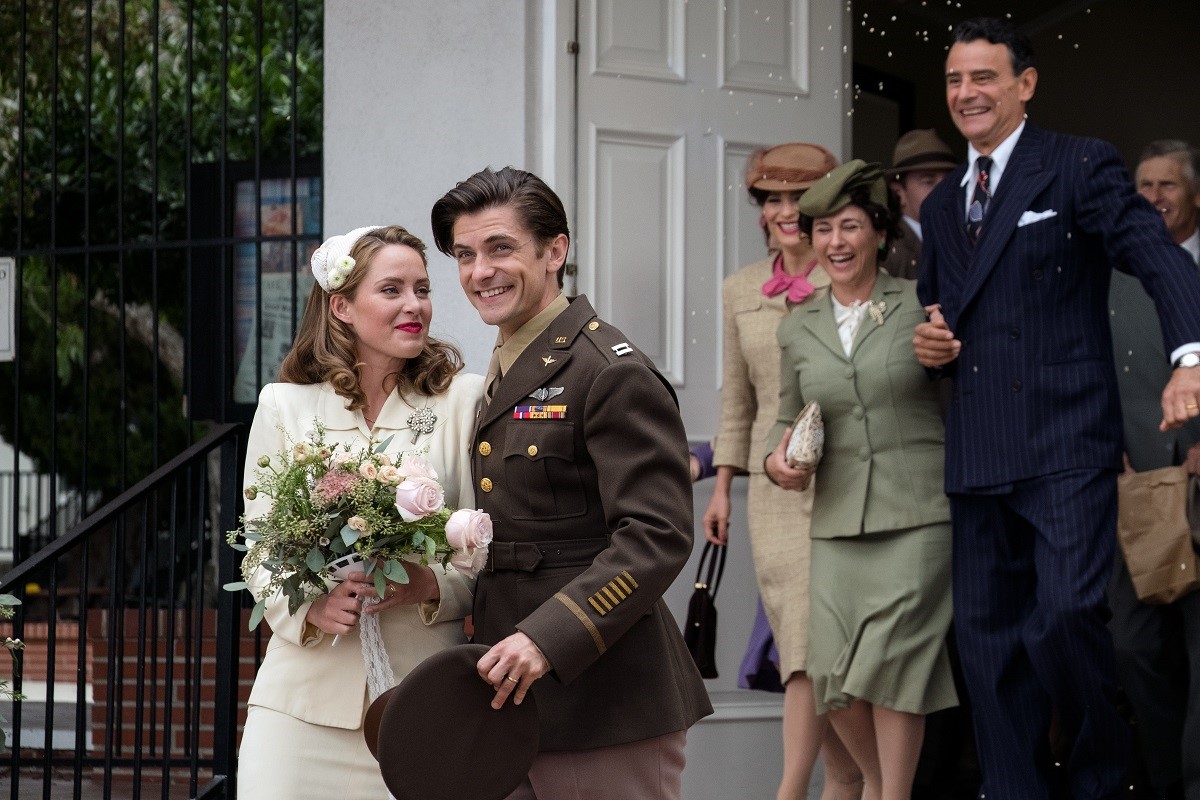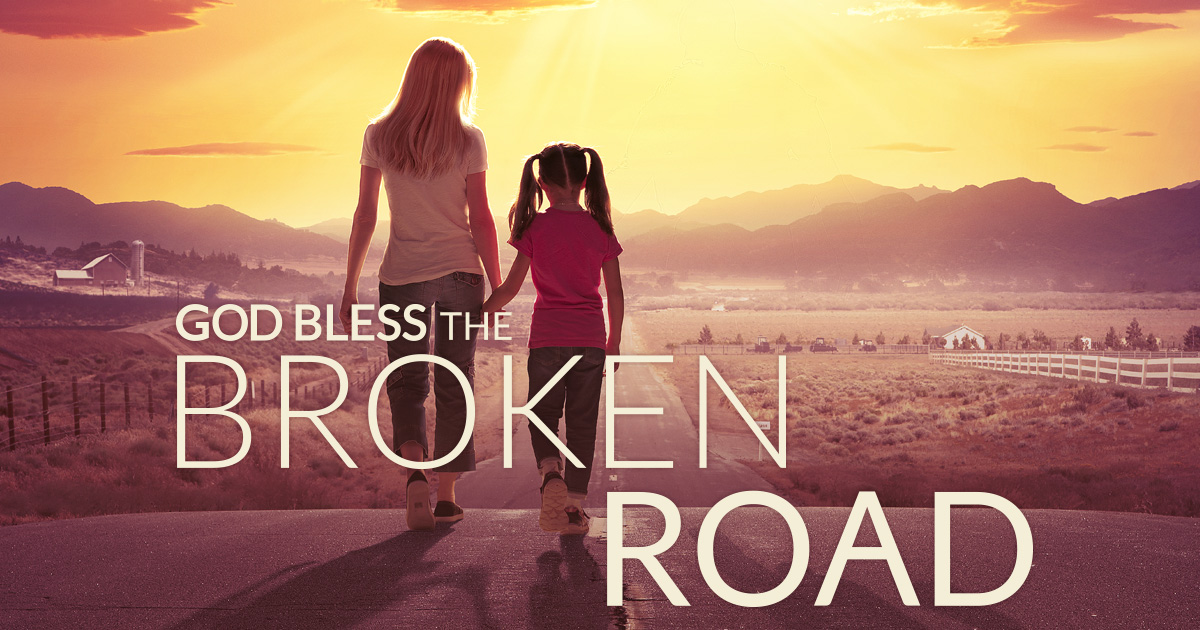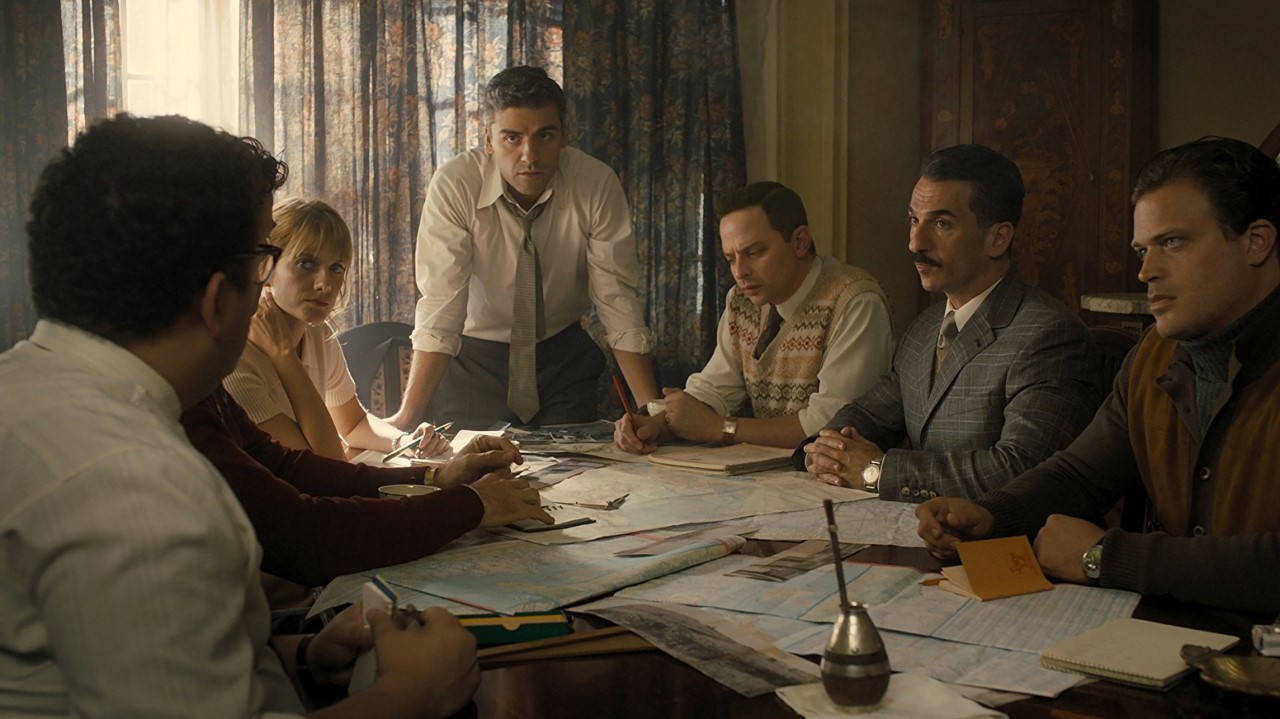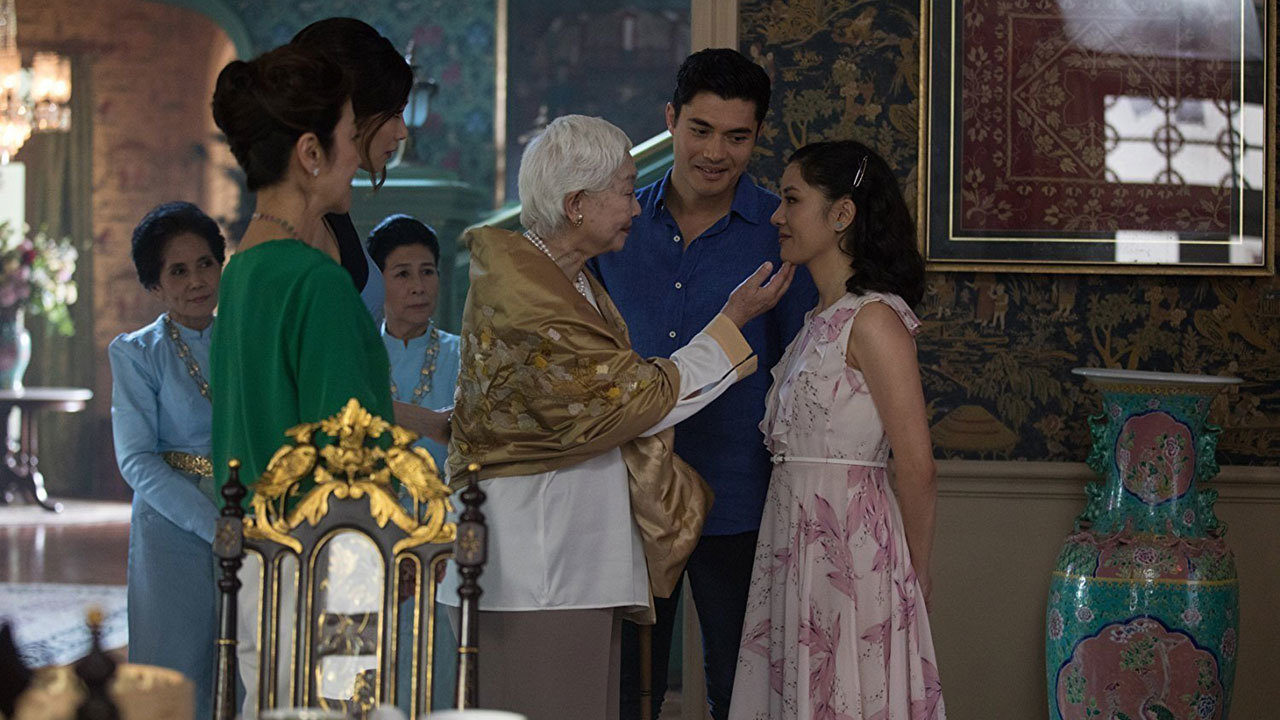
by Michael Foust | Sep 14, 2018
‘Unbroken: Path to Redemption’ tells the next chapter in Louis Zamperini’s life, from the time he returned to America a bitter man to the moment he found Christ at a Billy Graham Crusade.
Louis Zamperini isn’t the type of person you’d expect to see at a Billy Graham Crusade. But he is the type of person who needs to be there.
“God is my enemy,” he tells his wife.
Zamperini, though, says he has reason to be angry at God. A bombardier during World War II, his plane crashed at sea due to mechanical failure, forcing him to survive on raw fish and birds as he drifted aimlessly on a raft for 47 days. And when he did find an island, he was captured by the Japanese, placed in a prison camp, and brutally tortured for two years. On multiple occasions, he nearly died.
Now he’s back in the United States, trying to find hope and purpose in life during post-war America. But without a college education, he’s having trouble finding a job. And thanks to a recent injury, his track-and-field Olympic dreams are over, too.
So Zamperini turns to alcohol to hide his sorrows. Instead of looking for a job, he visits bars. He also hides money from his wife and his favorite adult beverages in the toilet tank.
Louis Zamperini is an angry, bitter man who has few goals in life, other than to return to Japan and kill his captors. His wife, sensing hopelessness, wants a divorce.
Then a miracle happens. She invites him to the 1949 Los Angeles Billy Graham Crusade, where he accepts Christ. Soon, he’s considering the unthinkable: traveling back to Japan to forgive his captors instead of killing them. Will he find the power to follow through and do it?
The film Unbroken: Path to Redemption (PG-13) opens this weekend, telling the true-life story of Louis Zamperini’s return to America. It is a sequel to the 2014 hit movie Unbroken and has the same producer (Matthew Baer), even if it does have a new cast. It is based on the bestselling book by Laura Hillenbrand. The film stars Samuel Hunt (Chicago Fire, Chicago P.D.) as Zamperini; Merritt Patterson (The Royals) as his wife, Cynthia; and Will Graham, the grandson of Billy Graham, as the famous evangelist.
It was made in partnership between Universal 1440 Entertainment and two faith-based companies: PureFlix and The WTA Group.
The movie opens where the 2014 film ended. The war is over, and veterans like Zamperini are trying to get their lives back on track.
Unbroken: Path to Redemption is well done and inspirational. Will Graham calls it “one of the greatest stories of forgiveness outside of the Bible.” I agree.
Warning: minor/moderate spoilers!
(Scale key: none, minimal, moderate, extreme)
Violence/Disturbing
Moderate. Zamperini has flashbacks to his days of being tortured and being hit, although none of the scenes are grotesque. He and Cynthia have an argument; he pushes her to the bed. He throws items off the dresser.
Sexuality/Sensuality/Nudity
Minimal. A beach scene includes a few women in 1940s-style swimsuits. We see men without their shirts. Louis and Cynthia kiss several times.
Coarse Language
None.
Other Positive Elements
Zamperini comes from a family of faith, and we hear them pray in the name of the Father, the Son and the Holy Spirit. Cynthia – often an unsung hero — considers but later rejects divorce as an option.
Other Stuff You Might Want To Know
Zamperini drinks alcohol and visits bars.
Life Lessons
Unbroken: Path to Redemption is full of biblical messages: forgiving those who have wronged you (Louis) and never giving up on someone who needs help (Cynthia pursuing Louis), among them. The perils of war and post-traumatic stress disorder also are major themes, along with the need to reach out to veterans and military families.
Worldview
The Apostle Paul’s testimony likely ranks at the top of the most dramatic conversion stories of all time. But if we are to take Will Graham’s advice and consider stories outside of Scripture, then I suspect Louis Zamperini’s life would rank pretty high. In the filthy Japanese prison, he was regularly beaten and tortured. One time, he was told to hold a beam over his head and if he dropped it, he would be shot. Another time, he was treated as a lab rat and given experimental medicines that caused severe pain. Covered with lice and mosquitoes, Zamperini was given just enough food to stay alive. He weighed less than 100 pounds when the war ended.
But because his sins were forgiven by Christ, he was compelled to forgive his captors – the very men he formerly hated and wanted to kill. It’s a powerful example of the Gospel.
Someone once said that “the glory of Christianity is to conquer by forgiveness.” That’s what Zamperini did. Eventually, he became a Christian evangelist.
Cynthia, too, is a hero in this story. Without her patience and her desire to forgive her husband, we likely never would have heard of Louis Zamperini.
What Works
Zamperini’s appearance in front of the Japanese is powerful. Also, Will Graham is stellar as his grandfather. The 1949 Crusade was a turning point in Billy Graham’s ministry, and filmmakers did a great job recreating it.
What Doesn’t
Some of the flashback/nightmare scenes. A few of them work, but the others are odd.
Discussion Questions
- Do you think you could have done what Zamperini did?
- Is there someone you need to forgive? What’s holding you back?
- Why is forgiveness sometimes so hard? What do we lose by failing to forgive? What do we gain by forgiving?
- Do you sense God is wanting you to be a “Cynthia” for someone?
Entertainment rating: 3 out of 5 stars. Family-friendly rating: 3.5 out of 5 stars.
Rated PG-13 for thematic content and related disturbing images.

by Michael Foust | Sep 7, 2018
The faith-based ‘God Bless the Broken Road’ (PG) opens in theaters this weekend, telling the story of a widow who is struggling to cope with life after her husband is killed in combat.
Amber Hill is a depressed, single mom who has no time for church. Honestly, though, she doesn’t want to go, anyway.
Two years ago, she was a joy-filled Christian at her small church, where she played the guitar, led the choir and spread smiles wherever she went. Her demeanor changed when her husband, a member of the U.S. military, was killed in Afghanistan. She hasn’t been the same person since.
Amber still has a Bible on her nightstand, but she doesn’t read it. She also doesn’t sing or smile, either. Instead, she goes through the motions of raising a young daughter while juggling her job at the local diner.
When her friends try to lift her spirits, she rejects them.
“I tried putting my faith in God,” she tells them. “Look where it got me.”
And now she’s being threatened with eviction from her home – the very home where she built so many wonderful memories with her husband.
What will it take for Amber to rediscover her faith in God?
The faith-based God Bless the Broken Road (PG) opens in theaters this weekend, telling the story of a widow who is struggling to cope with life until she reaches rock bottom and finally accepts the help of others. Along the way, she also meets the new man in town – a race car driver – who provides a spark of joy to her and her daughter.
It stars Lindsay Pulsipher (Hatfields & McCoys, Law & Order: Special Victims Unit) as Amber; Andrew W. Walker (Snowed-Inn Christmas) as her romantic interest, Cody; singer Jordin Sparks as her friend, Bridgette; Robin Givens (God’s Not Dead 2) as her friend, Karena; Madeline Carroll (I Can Only Imagine) as her daughter’s teacher; and former NFL star LaDainian Tomlinson as her pastor. It was directed by Harold Cronk, who also directed the first two God’s Not Dead films.
The movie serves as a tribute to veterans while combining elements popular among a conservative audience: faith, stock car racing (Cody is a NASCAR driver sent down to the minor leagues) and country music (the movie is based on the popular song by the same name).
Warning: minor/moderate spoilers!
(Scale key: none, minimal, moderate, extreme)
Violence/Disturbing
Minimal. We see a recreated battle scene. We see someone shot and killed. A car race ends with a crash.
Sexuality/Sensuality/Nudity
None.
Coarse Language
None.
Other Positive Elements
The Gospel is at the core of the movie, from the opening scenes to the final moments when Amber – who had been avoiding details of her husband’s death – learns how he died in combat. We also see Amber’s pastor deliver a sermon on rescuing those who have strayed from the church.
Other Stuff You Might Want To Know
A child runs away from home.
Life Lessons
God Bless the Broken Road provides positive messages on reaching out to people who are hurting, coping with tragedy and honoring veterans.
Worldview/Application
There are at least three faith-based movies about veterans releasing this fall, but God Bless the Broken Road is the only one that spotlights the death of a military member and its aftereffects. It can be difficult to watch. Amber’s daughter, Bree, wants her mom to bounce back to her cheerful self, but she finds it impossible to do. So she lays in bed each morning, staring at the ceiling.
Scripture is filled with passages commanding us to put the interests of others ahead of our own interests (Phil. 2:3, Matt. 20:26-27, John 15:12-14). The film reminds us to reach out to the brokenhearted. The film also does a nice job paying tribute to those who are willing to pay the ultimate sacrifice and put their life on the line each day in military service.
LaDainian Tomlinson, an NFL Hall of Famer who played college football at TCU and is outspoken about his faith, said he was thinking about members of his family who are in the military while playing the role. He wants the film to encourage military families.
“I kept that in mind when I was doing this film – just how much of an impact it will have for my family members, my friends, that are in that same situation (as Amber). Even if they don’t die and even if they do come back, they’re still away from their family for a long time,” he said. “And that’s a struggle for many wives and children to have their father or mother away, serving our country.”
What Works
The movie’s portrayal of Amber’s struggles seems authentic. The car race scenes, too, are well-done. The movie’s military message will be particularly touching for moviegoers with military ties.
What Doesn’t
Some of the spiritual dialogue falls flat and doesn’t seem genuine.
Discussion Questions
- How many people were responsible for rescuing Amber? What can that teach us about reaching others who are coping with tragedy?
- What would you have told Amber? Would you have said what her friends told her?
- Name some ways the church can help those who are struggling financially.
- Name some ways the church can encourage military spouses and families.
Entertainment rating: 2.5 out of 5 stars. Family-friendly rating: 4.5 out of 5 stars.
Rated PG for thematic elements and some combat action.

by Michael Foust | Aug 31, 2018
The historical drama ‘Operation Finale’ opened in theaters this week, recounting the true story of how a band of Israelis found Holocaust mastermind and Nazi Adolf Eichmann, who had been hiding out in Argentina for a decade.
Ricardo Klement is a common man in 1960 Argentina who wakes up early each morning, so he can take the bus to the automobile factory and support his family.
Or so everyone thinks.

Ben Kingsley as Adolph Eichmann
His real name is Adolf Eichmann – the Nazi German official who rose to lieutenant colonel and was considered the “mastermind” of the Holocaust that left an estimated 6 million Jews dead during World War II. After the war, he fled Europe to hide out in Argentina.
Few people in Argentina know his real identity, but that is about to change. Israeli government officials have learned his location and given a small group of covert operatives a monumental task: kidnap Eichmann – without killing him – and bring him back to Israel where he will stand trial for war crimes.
Before they leave, Israel’s prime minister pleads: “For the sake of our people, I beg you, do not fail.”
The historical drama Operation Finale (PG-13) opened in theaters this week, recounting the true story of how a band of Israelis plotted and then successfully captured Eichmann without requesting permission from the Argentina government, which had a history of not extraditing former Nazis.
It stars Oscar Isaac (The Force Awakens, The Last Jedi) as Israeli operative Peter Malkin, Ben Kingsley (Gandhi, Schindler’s List) as Eichmann, and Mélanie Laurent (Now You See Me) as Hanna Elian, the Israeli doctor in charge of sedating Eichmann.
Operation Finale is the best historical drama yet of 2018 and perhaps even better than 2017’s Darkest Hour and Dunkirk, two other World War II films. In Operation Finale, we experience not only a nail-biting escape but also the emotions of Malkin and the other Israelis, who lost family members in the Holocaust and are tempted to kill Eichmann before he is flown back to Israel.
Still, it’s not a kid-friendly movie.
Warning: minor/moderate spoilers!
(Scale key: none, minimal, moderate, extreme)
Violence/Disturbing
Moderate. We see frequent flashbacks to World War II and the Holocaust. We see a dead woman hanging from a tree, with Nazi soldiers laughing. Later, we see a truckload of bodies, and soldiers shooting a group of Jews. We also hear Eichmann describing, in detail, the killing of a mother and her baby. We hear Israelis discussing the family members who were killed.
Sexuality/Sensuality/Nudity
Minimal. A couple share a kiss. A man tries kissing a woman in a car, but she refuses.
Coarse Language
Moderate. About 19 coarse words: s—t (10), a—(3), misuse of “God” (1), d—n (1), h—l (1), f-word (1), SOB (1), n-word (1).
Other Stuff You Might Want To Know
Teenagers watch a theatrical movie that includes the n-word. The Israelis celebrate by drinking alcohol. We see someone sitting on a toilet.
Life Lessons
Not surprisingly, Operation Finale is full of life lessons and positive messages. We see racism confronted, head-on, via words and deeds. We see what happens when the church fails to oppose evil, as in the case of priests in Operation Finale who hide and side with the Nazis. We see the famous verse in the Old Testament – “your sin will find you out” (Num. 32:23) – put on display as Eichmann is hunted and finally found.
Operation Finale also delivers lessons on truth vs. relativism (see below) and justice vs. revenge (see below).
Worldview/Application
Truth vs. relativism: The world knows Adolf Eichmann as the man responsible for the deaths of millions of Jews. That’s not how he sees it. “We tried to save Jewish lives,” he claims, saying no country would accept the Jews. As for his role in the Holocaust? He was just following orders. “I was merely a cog in a machine.” When Eichmann is confronted by the truth of the Holocaust and what happened in the war, he retorts, “What is truth? Whose truth?” Eichmann believes there are two sides to the story of the Holocaust – and that the Nazi side needs to be told.
The Christian faith, though, is built on absolute truth. Scripture even says that “lying lips are an abomination to the Lord” (Proverbs 12:22). God is a God of truth. Either millions of Jews were killed during World War II … or they were not. General Dwight D. Eisenhower, upon entering the concentration camps after the war, said he encountered one room where 20-30 naked bodies were piled. His companion, George Marshall, refused to enter out of fear he would get sick. But Eisenhower made himself enter “in order to be in position to give first-hand evidence of these things if ever, in the future, there develops a tendency to charge these allegations merely to propaganda.” For the Holocaust – and for everything else – there aren’t “two truths.”
Justice vs. revenge. Revenge is a powerful emotion. No doubt, we can empathize with the Israelis who wanted to kill Eichmann, on the spot. They complained that he didn’t deserve a trial. But the Israeli prime minister wanted something else. He wanted justice: “If you fail,” he told the group, “he escapes justice, possibly forever.” Yes, Eichmann would have faced justice when he stood before God, but God has ordained governments to administer earthly justice (Rom. 13). It is not for the individual to employ.
What Works
Operation Finale has few weaknesses, but the staking out of Eichmann’s home and the capture of him in the middle of the night is a highlight. Also, Kingsley is stellar as Eichmann.
What Doesn’t
Not applicable.
Discussion Questions
- Would you have been tempted to kill Eichmann? Would that have been morally permissible? Why or why not?
- Eichmann says he was merely following orders? Even if true, is he still morally guilty of the Jews’ deaths?
- How would you answer someone who asked, “What is truth?”?
- Why is racism wrong? Use Scripture in your answer.
Entertainment rating: 4 out of 5 stars. Family-friendly rating: 3 out of 5 stars.
Rated PG-13 for disturbing thematic content and related violent images, and for some language.

by Michael Foust | Aug 24, 2018
The romantic comedy ‘Crazy Rich Asians’ (PG-13) tells the story of a young rich man who must choose between family and love. It’s got a great message, but is it OK for the whole family?
Nick Young is a charming bachelor living in the United States who happens to come from one of the most well-known and wealthy families in China.
His girlfriend, though, knows nothing of his fame. Her name is Rachel Chu, a Chinese American who teaches economics and is the youngest professor at New York University. Her background is middle class, having come from a self-made single mother who put her daughter ahead of her happiness. Rachel’s future in academia seems bright.
Nick believes he’s discovered the woman of his dreams – the woman he will marry – but first, he must win the blessing of his family back in Asia. And he hopes that will take place during a trip to Singapore for his best friend’s wedding.
Thus, Nick and Rachel board an airplane to cross the Pacific for one of the most extravagant weddings ever held. Unfortunately, though, few of Nick’s family members or friends like Rachel. First off, she comes from a common background. She’s not rich. Second, she has American values – not Asians ones. But their biggest problem? She’s a Chinese American, and not native-born Chinese.
What will Nick choose if he must pick between his family and Rachel?
The romantic comedy Crazy Rich Asians (PG-13) is now in theaters, telling the story of a young man who is the successor to his family’s business and wealth but must decide if he will throw it all away when his mother rejects Rachel. The film is drawing attention in part because it is being billed as the first Hollywood film in 25 years to feature an all-Asian cast in a modern setting.
It stars Henry Golding as Nick Young; Constance Wu as Rachel Chu; Michelle Yeoh (Kung Fu Panda 2, Guardians of the Galaxy 2) as Nick’s mother, Eleanor; and Awkwafina (Ocean’s 8, Storks) as Rachel’s quirky friend, Peik Lin Goh.
Rachel is the film’s primary character, as we watch her emotions evolve from shock (at Nick’s wealth) to depression (at the family’s reaction) to resolve (to see Nick’s family change).
Crazy Rich Asians is one of the funniest and most touching romantic comedies of the year, and it also carries with it several positive lessons normally not seen in Hollywood comedies (partially because Nick’s family are Christian). Unfortunately, it has enough sexual innuendo and language to prevent me from fully endorsing it for families.
Warning: minor/moderate spoilers!
(Scale key: none, minimal, moderate, extreme)
Violence/Disturbing
Minimal. We see two men fighting on a movie set.
Sexuality/Sensuality/Nudity
Moderate. The film doesn’t contain the wall-to-fall low-brow humor found in other comedies – or any nudity, either – but it has just enough sexual content to frustrate the traditional moviegoer. Nick and Rachel sleep in the same bed; we don’t see them do anything except briefly kiss, sex is implied. We see two people make out (standing up, in public) on a movie set. We hear a joke about a female visitor to a party being a porn star. We learn that someone (not Nick or Rachel) is having an affair. Someone makes fun of Rachel’s anatomy. For parents, two of the biggest problems in the movie involve immodest dress throughout the film and a bachelor party on a boat that contains women in bikinis. Thankfully, Nick has enough sense to leave the out-of-control party. The film contains frequent kissing.
Coarse Language
Moderate. About 26 coarse words: a– (5), OMG (5), b–ch (4), h-ll (3), GD (2), s–t (2), d–n (2), f-word (1), misuse of “Jesus” (1), b—ard (1). Much of the language is said by two characters: Peik Lin Goh and another male character (not Nick).
Other Positive Elements
Nick’s mother leads a Bible study, and we hear her and her friends quoting verses. (“Set your minds on things that are above,” she says). Someone says of Rachel, “I do hope she’s a good Christian girl.” Later, we learn they are Methodist. Nick’s family is close; his grandmother still lives with the family. The family-centric nature of the Asian culture is one of the major themes. Indeed, the film celebrates not only families but large family structures.
Other Stuff You Might Want To Know
We see people drinking and gambling.
Life Lessons
Crazy Rich Asians includes positive messages against racism and on forgiveness, humility, putting family first (see below) and wealth. Despite growing up in a filthy-rich environment, Nick doesn’t boast about his money. In fact, he goes so far as to shield Rachel from the truth. She doesn’t discover his family is rich until they’re on the airplane, in the first-class section. Why? He wanted a wife who loved him for who he was – and not for what he had. Contrast that with his family, who only hang out with those who are rich.
Worldview/Application
Nick’s mom has her problems, but she raises a few valid questions, too. Among them: What should we do when we’re choosing between family and career? “We know to put family first instead of chasing one’s passion,” she says, affirming what she sees as the Asian ideal. She’s critical of Rachel and other Americans for casting aside their family to pursue their dreams. In her mind, you can’t have both. And in Crazy Rich Asians, she has a point. If Nick and Rachel marry, then they might move to America and leave the family’s business in ruins. Is it possible to have both? Scripture commands us to care for our family (1 Timothy 5:8). It also tells husbands and wives to leave and cleave (Genesis 2:24). The topic is too complex to provide a full treatment here, but Crazy Rich Asians raises a few topics that are worthy of discussion over a hot cup of coffee.
What Works
The comedy. (A father tells the kids to eat their food because there are “a lot of children starving in America.”) The film also does a nice job introducing an American audience to Asian traditions.
What Doesn’t
Some of the content. Take out about four minutes of the film and a few coarse words, and this film is flirting with a PG rating. Too bad Hollywood falsely believes moviegoers won’t support PG movies.
Discussion Questions
- Does a person’s wealth change how you view him or her? Why or why not?
- What is God’s purpose for wealth?
- If Nick’s family were Christians, then why did they mistreat Rachel?
- Who was right in the debate about family and happiness – Nick’s mom, or Nick and Rachel?
- What is the movie’s message about racism and diversity?
Entertainment rating: 3 out of 5 stars. Family-friendly rating: 2.5 out of 5 stars.
Crazy Rich Asians is rated PG-13 for some suggestive content and language.
Photo Credit: Warner Brothers

by Michael Foust | Aug 21, 2018
This week, moviegoers get a chance to watch another movie that tells the fictional story of a man who talks to God. But does the dialogue square with Scripture?
Movies that depict God appearing in bodily form and talking to modern man – such as Bruce Almighty or The Shack – can be fraught with theological problems.
First, the filmmaker faces the temptation of placing ideas in the movie that might fit his or her worldview but aren’t found in Scripture. Then, the filmmaker must choose which actor (or actress) will play the role – all of whom will bring their own flaws to the film. Finally, there’s the not-so-small problem of placing imagined dialogue in the mouth of God. For some Christians, that’s a non-starter.
This week, moviegoers get a chance to watch another movie that tells the fictional story of a man who talks to God. Called An Interview With God (unrated), it shows in theaters for three nights only (Monday, Tuesday, Wednesday) and depicts a dejected newspaper journalist named Paul Asher who is granted three separate interviews with God, spanning 30 minutes apiece.
Brenton Thwaites (Pirates of The Caribbean: Dead Men Tell No Tales) plays Asher, a man who once had a strong faith but began having doubts about God following a trip to cover the war in Afghanistan. He’s also fighting to save his crumbling marriage. Academy Award nominee David Strathairn (Good Night, and Good Luck) plays God. The movie was made in part by Giving Films, which also was involved in 90 Minutes in Heaven and Paul, Apostle of Christ.
Artistically, An Interview With God is gripping and entertaining. The back-and-forth dialogue between Asher and God dominates the film, as we hang on every single word and wonder, “What will Asher ask next? What will God say? What would we ask?” Thwaites and Strathairn are stellar. The film score is a perfect fit, too.
But these types of films – at least among evangelicals – are always judged theologically. Thankfully, there is some good news: An Interview With God succeeds in areas where The Shack failed, such as in affirming the exclusivity of Christ.
“Jesus was super clear in John 14:6: ‘I am the way, no one comes to the Father but through me,’” Asher says.
“Seem very clear to me,” God responds. Later, God adds, “Everyone has their own journey but there is only one path.”
Asher defines salvation as “returning to a state of perfection with the Almighty and absolution from sin forever” – a definition that God labels “excellent.”
God also tells Asher that he always has existed and that he exists outside of time.
“After all, I created time,” he says.
God’s love is affirmed again and again in the movie – as is his omniscience.
“You have no secrets from me,” God says.
“Yeah, I do.”
“No, you don’t,” God responds.
“Yeah, I do!” Asher says, angrily. “… My personal life is off-limits.”
God, referencing Asher’s marriage, says, “I would like to help you if you would let me.”
The movie, though, doesn’t get everything right. Asked if the Torah and the New Testament are the Word of God, God says, “Of course. But as understood by man and as translated by man.” Asher responds that the definition leaves wiggle room. And during one moment in the film, God mentions the days of Noah and says, “Was I too vengeful back then? Maybe.”
Overall, though, the film gives us a picture of God that is closer to Scripture than seen in most movies like these – and one that can be used as a discussion-starter with unbelievers. That’s progress.
An Interview With God contains no violence or sexuality, although an affair is discussed. The movie contains no coarse language.
Entertainment rating: 4 out of 5 stars. Family-friendly rating: 4 out of 5 stars.
For a list of theaters, visit AnInterviewWithGod





